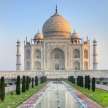History of India
Historical Histories of India

India boasts a rich history spanning millennia, characterized by a multifarious mosaic of cultures, religions, and civilizations. The subcontinent has had important historical events that have influenced its identity, from the time of the ancient Indus Valley Civilization to the present.
With the rise of the Indus Valley Civilization circa 3300 BCE, the origins of Indian civilization can be found in the Bronze Age. This highly developed civilization, which flourished along the banks of the Indus River, was known for its well-planned towns, such as Mohenjo-daro and Harappa. These cities demonstrated complex urban life, complete with sophisticated drainage systems and an unreadable script.
Waves of Indo-Aryans arrived in the Indian subcontinent circa 1500 BCE, bringing with them their contributions to the writing of the Vedas, which are considered sacred books. The emergence of theological and philosophical concepts that became the cornerstone of Hinduism during this era signified the beginning of Vedic civilization.
The succeeding years saw the birth and collapse of several dynasties, with the Maurya Empire (c. 322–185 BCE) under Emperor Ashoka standing out as one of the first significant pan-Indian empires. Ashoka, who is well-known for having converted to Buddhism and spreading its ideas, had a profound influence on Indian society.
India's "Golden Age" began with the Gupta Dynasty (c. 320–550 CE), which followed the fall of the Mauryan Empire. Significant progress was made in the fields of science, mathematics, literature, and art during this time. Classical Sanskrit literature, the decimal system, and the idea of zero flourished, making a lasting impression on the history of ideas worldwide.
During the Middle Ages, strong empires like the Delhi Sultanate in the north and the Cholas in the south rose to prominence. The first substantial Islamic presence in India was during the Sultanate, which resulted in the blending of Hindu and Islamic civilizations, which is especially evident in art and architecture. The creation of the Bahmani Sultanate and the Vijayanagara Empire added to the diversity of medieval India's cultures.
Mughal sovereignty was established in India in 1526 when Babur, the founder of the Mughal Empire, beat Ibrahim Lodhi in the Battle of Panipat. The blending of Persian and Indian cultures was facilitated by the Mughals, who are most known for building marvels like the Taj Mahal. One of the greatest Mughal kings, Akbar, promoted cultural syncretism and religious tolerance through his policies.
The Marathas and Sikhs were two of the regional powers who rose up in the 18th century to challenge Mughal rule. European colonial powers also arrived during this time, with the British East India Company becoming a major player. An important turning event that opened the door for British colonial rule in India was the Battle of Plassey in 1757.
The 20th century saw a surge in the independence movement, driven by leaders like as Mahatma Gandhi who promoted peaceful civil disobedience. The Indian National Congress was a key player in the movement for self-rule that resulted in Pakistan's formation and India's independence in 1947.
India experienced profound political and social transformations after gaining independence. The foundation for a pluralistic and diverse country was established in 1950 with the ratification of a democratic constitution. India became a major player in the world economy in the 1990s thanks to economic reforms that accelerated urbanization and technology development.
India's history is a tapestry woven with strands of medieval magnificence, ancient wisdom, and contemporary difficulties. The nation keeps changing, fortifying itself with a tenacious spirit and a multiplicity of cultures that speak to all generations.






Comments (1)
I'm drawn to this article; it's well-crafted and offers valuable information.